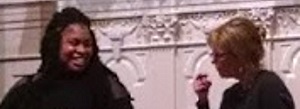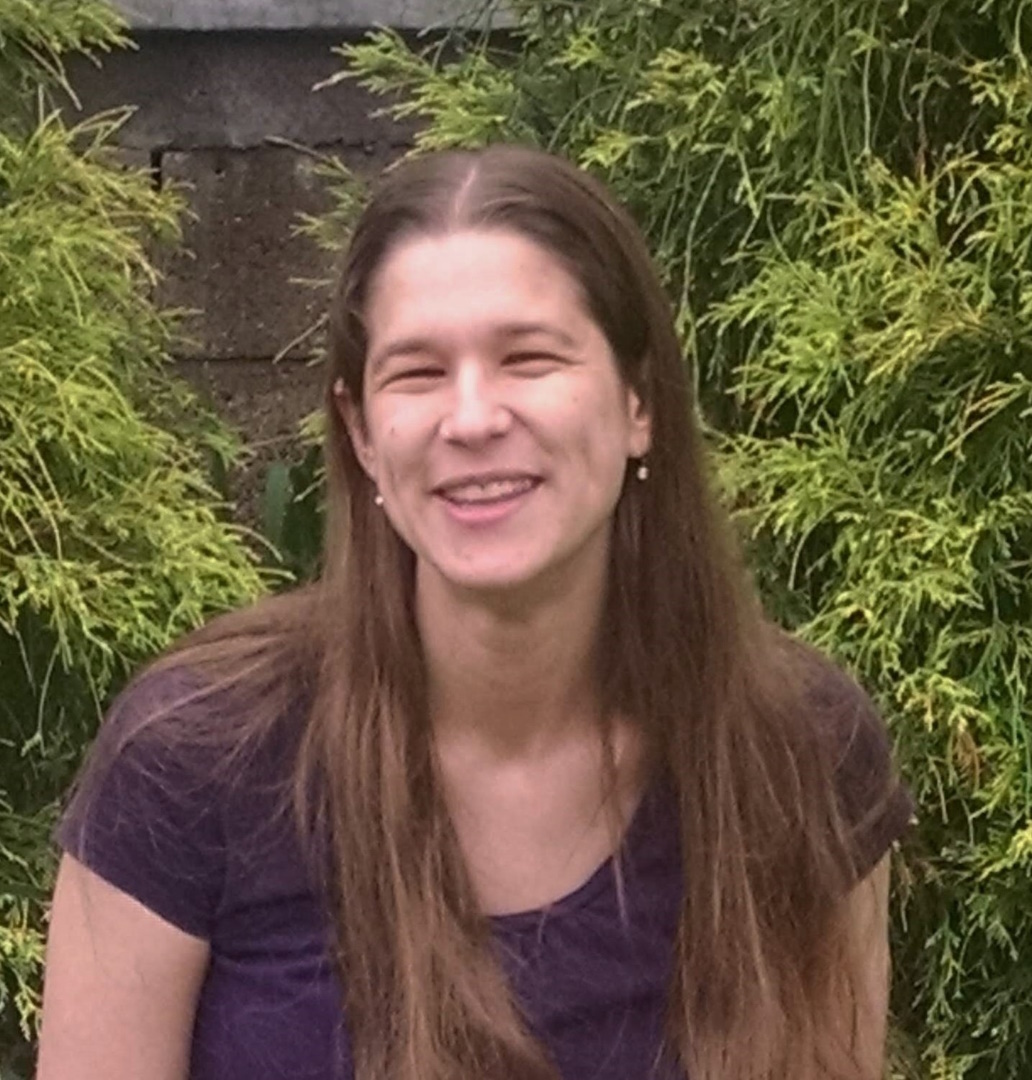
Find more great Horn Book content at these links:
Recommended books: reviews and themed booklists
App and e-book reviews
Movie reviews
Event news and recaps
Events calendar
Recap: Angie Thomas at First Parish Church in Cambridge, MA
I was lucky enough to be part of the sold-out audience at First Parish Church in Cambridge, MA, Tuesday night to hear her discuss The Hate U Give (HarperCollins/Balzer + Bray) with Here & Now radio host Robin Young, sponsored by Harvard Book Store and WBUR.
 I was lucky enough to be part of the sold-out audience at First Parish Church in Cambridge, MA, Tuesday night to hear her discuss The Hate U Give (HarperCollins/Balzer + Bray) with Here & Now radio host Robin Young, sponsored by Harvard Book Store and WBUR. It was the day after #AngieThomasAppreciationDay, and those present were clearly on board with the celebration.
I was lucky enough to be part of the sold-out audience at First Parish Church in Cambridge, MA, Tuesday night to hear her discuss The Hate U Give (HarperCollins/Balzer + Bray) with Here & Now radio host Robin Young, sponsored by Harvard Book Store and WBUR. It was the day after #AngieThomasAppreciationDay, and those present were clearly on board with the celebration. After talking a bit about the upcoming The Hate U Give movie (can’t wait!), Young remarked on protagonist Starr’s “Olympic-level gymnastic moves” to straddle two worlds. “I’m code-switching right now,” said Angie, explaining that if she spoke “a certain way,” the audience might see her as “ignorant.” Like Starr, she grew up in a predominantly black neighborhood and attended a predominantly white school. She’d leave home playing Tupac, she said, and by the time she got to school she’d be playing the Jonas Brothers. (“Do not judge me,” she added.) Like Starr, she felt the need to hide some of her experiences from her classmates, though she says that now, she’d be inclined to pull Starr aside and tell her that if she doesn’t feel she can trust her classmate Hailey with the truth, maybe Hailey isn’t really her friend. As Angie put it, the scariest thing isn’t shouting on top of a car at a protest, it’s correcting the people closest to you. Angie also asserted that her goal with the character of Chris was to show what a white ally looks like. Starr’s boyfriend isn’t perfect, she said, but he learns to do something important: he listens.
After talking a bit about the upcoming The Hate U Give movie (can’t wait!), Young remarked on protagonist Starr’s “Olympic-level gymnastic moves” to straddle two worlds. “I’m code-switching right now,” said Angie, explaining that if she spoke “a certain way,” the audience might see her as “ignorant.” Like Starr, she grew up in a predominantly black neighborhood and attended a predominantly white school. She’d leave home playing Tupac, she said, and by the time she got to school she’d be playing the Jonas Brothers. (“Do not judge me,” she added.) Like Starr, she felt the need to hide some of her experiences from her classmates, though she says that now, she’d be inclined to pull Starr aside and tell her that if she doesn’t feel she can trust her classmate Hailey with the truth, maybe Hailey isn’t really her friend. As Angie put it, the scariest thing isn’t shouting on top of a car at a protest, it’s correcting the people closest to you. Angie also asserted that her goal with the character of Chris was to show what a white ally looks like. Starr’s boyfriend isn’t perfect, she said, but he learns to do something important: he listens.When Young pointed out parallels between Starr and Diamond Reynolds, who witnessed the real-life shooting of Philando Castile, Angie said that she’d actually just written the last pages of the novel when that event occurred — and had to add his name to the list of victims Starr remembers alongside her friend Khalil. But earlier instances of police violence informed Starr’s story, of course — in particular, the 2009 shooting of Oscar Grant. Angie, who was in college at the time, heard two different types of conversations at home and at school; her neighbors were on Grant’s side, but white classmates found reasons to blame him. This left her with two options, she said: “burn down my entire campus,” or write. She chose the latter option, and the result was the short story that later became The Hate U Give.
 There were a few well-placed plugs for Angie’s second book, On the Come Up, out June 5th. Young mentioned that Angie had recently won a big award (ahem) and had said in her acceptance that she couldn’t believe she’d won an award for a book. She explained that teen Angie would be surprised that adult Angie isn’t a rapper, her previous, if short-lived, career. And then she gave us a preview of On the Come Up, rapping in character as protagonist Brianna.
There were a few well-placed plugs for Angie’s second book, On the Come Up, out June 5th. Young mentioned that Angie had recently won a big award (ahem) and had said in her acceptance that she couldn’t believe she’d won an award for a book. She explained that teen Angie would be surprised that adult Angie isn’t a rapper, her previous, if short-lived, career. And then she gave us a preview of On the Come Up, rapping in character as protagonist Brianna.We don’t give rap and hip-hop enough credit for their storytelling, Angie said. But she added that, although she didn’t connect with YA as a teenager (every book seemed to be “another white girl in distress”), that category shouldn’t be written off. She’d made assumptions based on the best-known books when she was a teen (Twilight and The Hunger Games), but exploring YA further, particularly books about characters of color, convinced her that YA is one of the most progressive categories out there. Teens tend to be more open-minded than adults and more willing to listen and learn, she said, and it’s an honor to write for and about them.
She also said that, although she didn’t see herself in many books growing up, she did recognize herself in Cassie Logan of Mildred D. Taylor’s Roll of Thunder, Hear My Cry — and that the book meant so much to her that a description of Cassie’s mother as a “disrupting maverick” inspired the name of Starr’s father, Maverick Cater.
The audience questions went in all directions, and Angie had eloquent answers for them all. Colorism in Hollywood. The Black Panthers. Where she was, physically, when she was inspired to write the book (the Woodrow Wilson Bridge in Jackson, Mississippi, when a real-life “Hailey” said they couldn’t cross into what was Angie’s neighborhood because “that’s where all the criminals live.”) A young woman asked about Tupac, and when Angie speculated about what Tupac could’ve been had he lived longer, the questioner interjected, “my husband.”
That was just one of many moments that brought down the house; there was plenty of discussion of serious subjects, but also plenty of humor — both of which had the audience snapping. Angie hinted about a possible prequel about Maverick, and at her interest in writing middle-grade fiction…leaving me hopeful that we’ll hear plenty more from her. Snaps to that.
Angie Thomas won the 2017 Boston Globe–Horn Book Fiction & Poetry Award for The Hate U Give. Read her acceptance speech here. For more, see our "Five Questions for Angie Thomas" interview.

RELATED
RECOMMENDED
ALREADY A SUBSCRIBER? LOG IN
We are currently offering this content for free. Sign up now to activate your personal profile, where you can save articles for future viewing.







Add Comment :-
Be the first reader to comment.
Comment Policy:
Comment should not be empty !!!